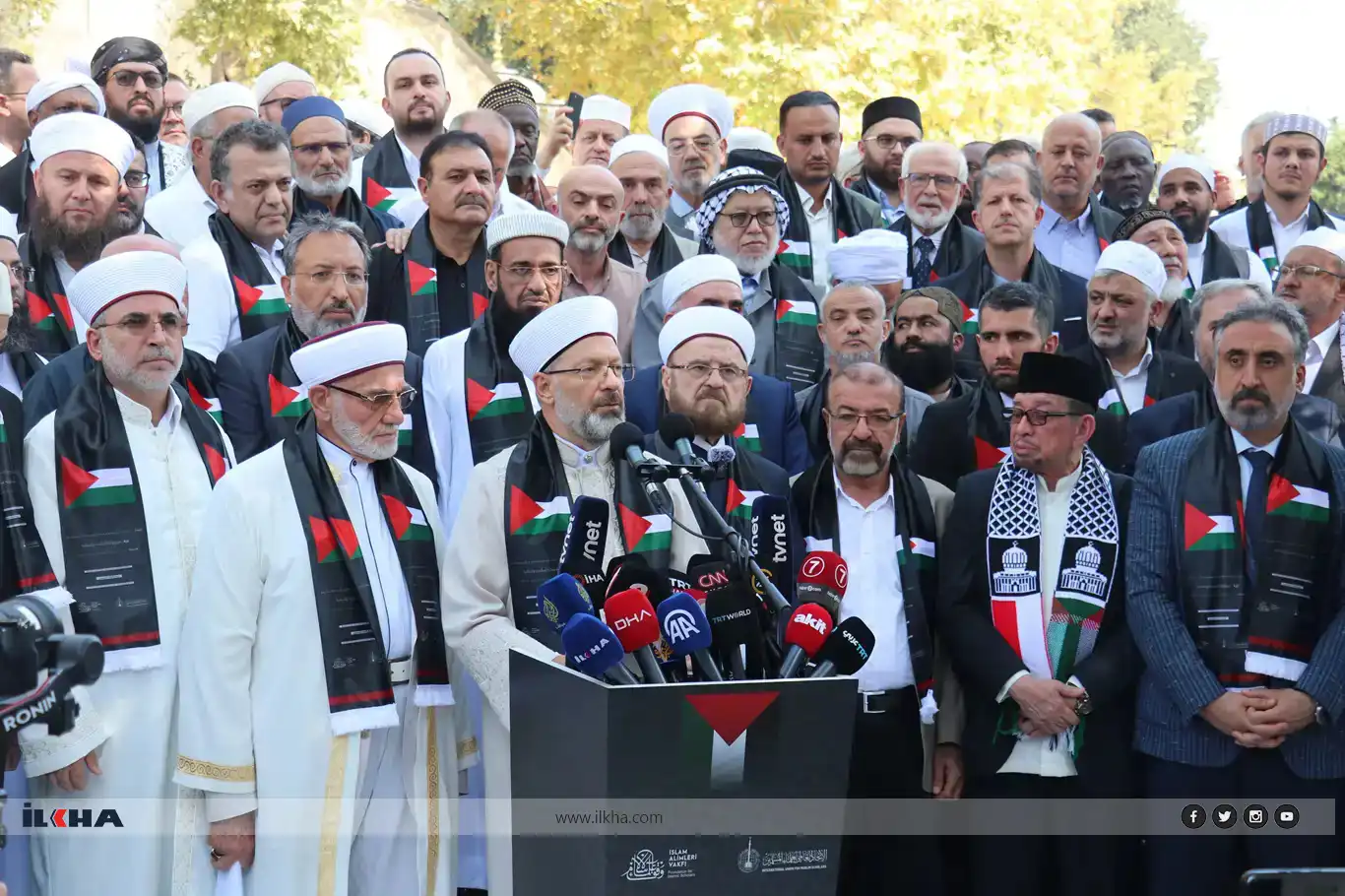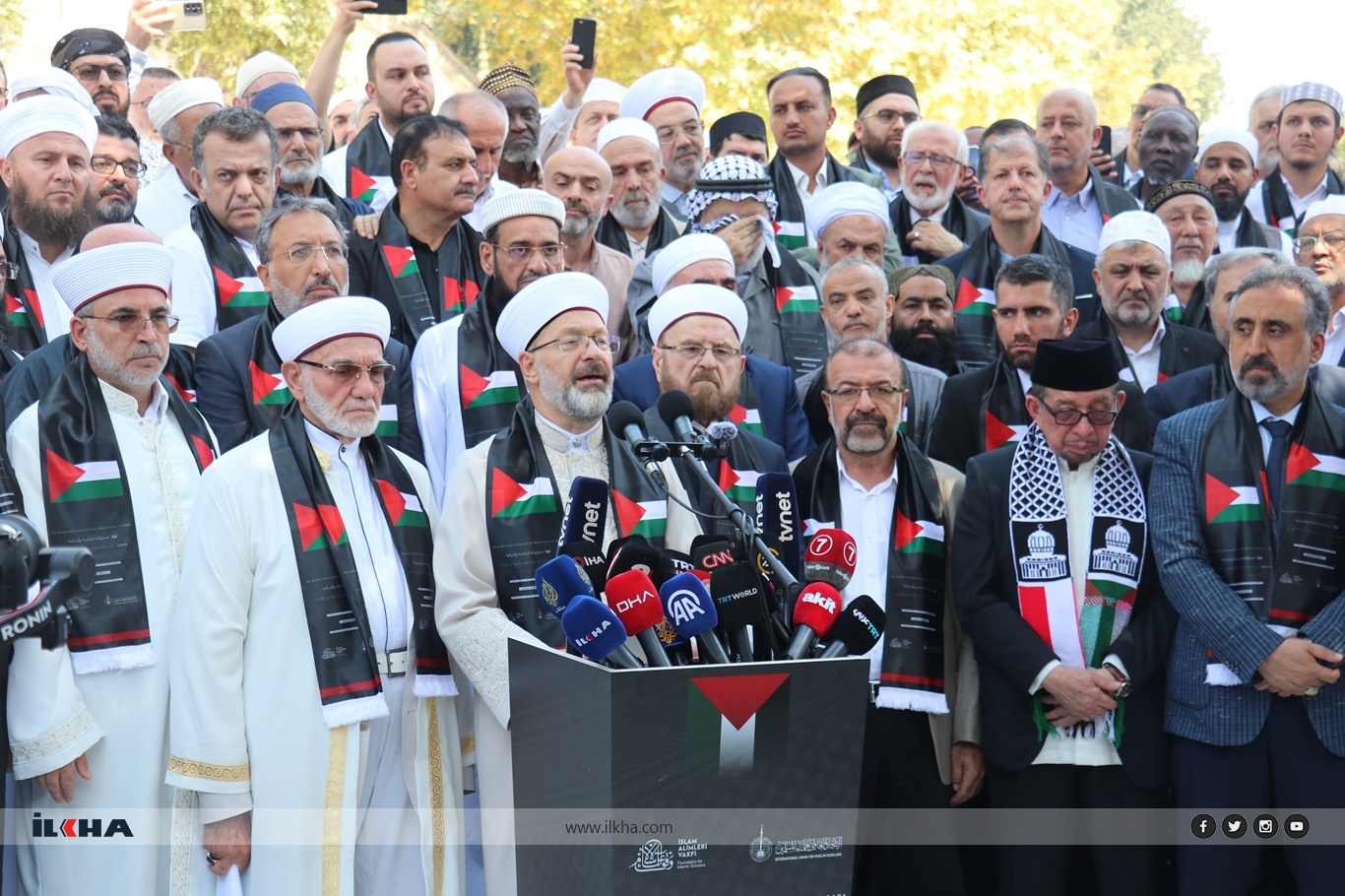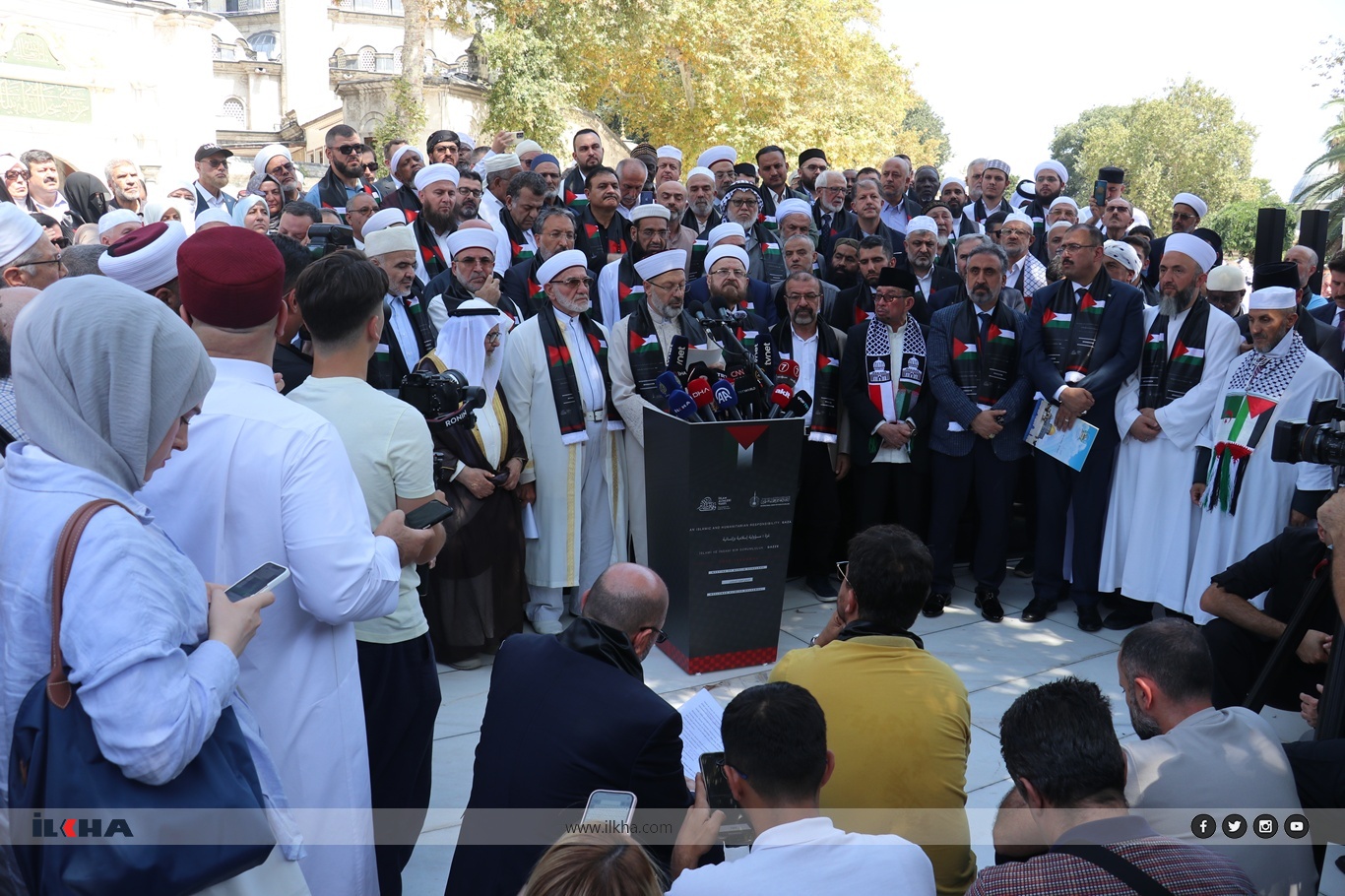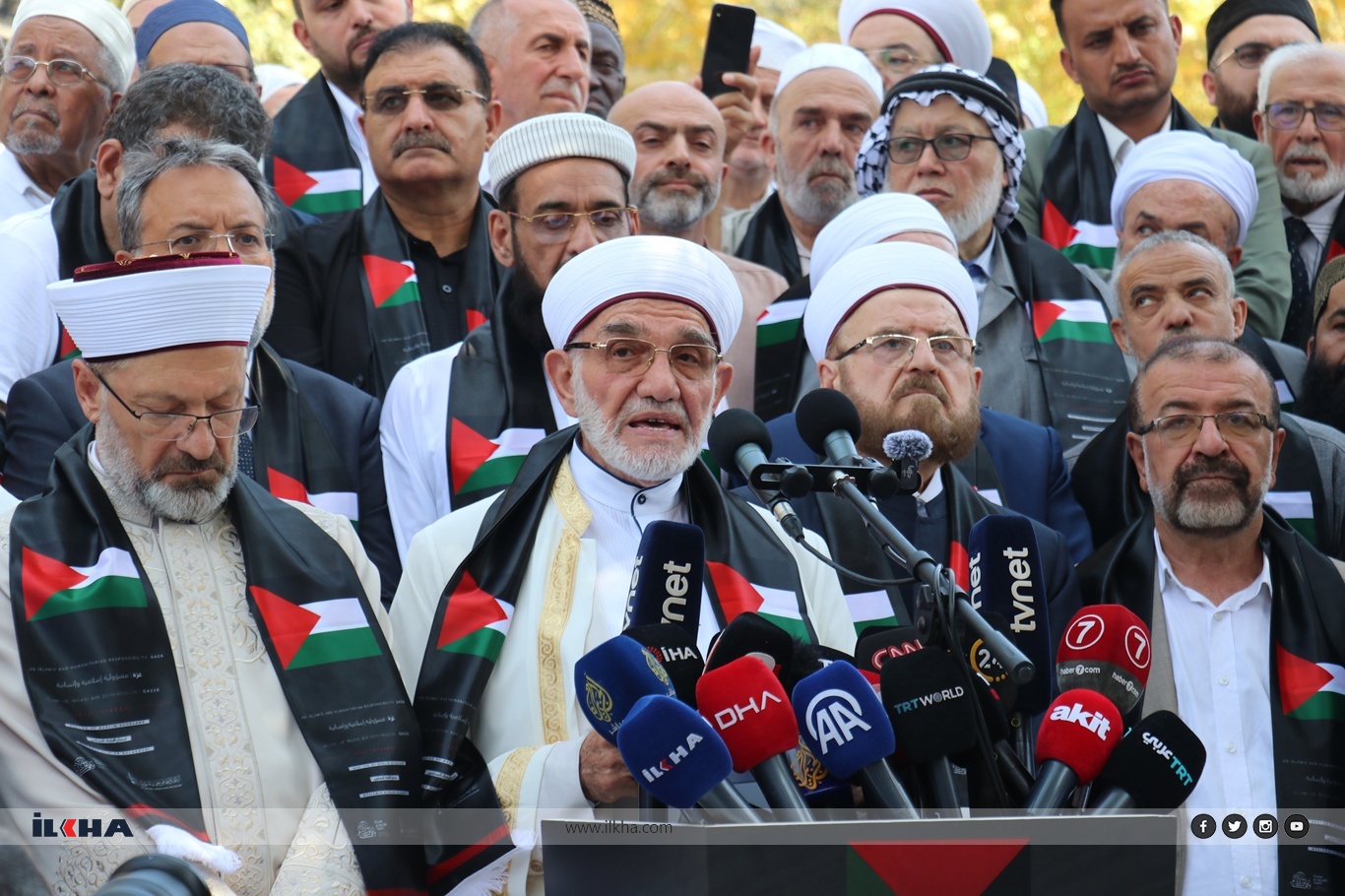Muslim scholars unite in Istanbul for eight-day conference to address Gaza crisis


More than 150 Muslim scholars, clerics, and intellectuals from over 50 countries convened at Istanbul’s historic Eyüp Sultan Mosque on Friday to launch an eight-day conference titled "Islamic and Humanitarian Responsibility: Gaza."
Hosted by the International Union of Muslim Scholars (IUMS) and Türkiye’s Foundation for Islamic Scholars, the event seeks to galvanize the Muslim world and the international community to confront what organizers describe as Israel’s ongoing genocidal war in Gaza, while advocating for urgent humanitarian action and a unified stance against regional aggression.
The conference commenced with Friday prayers at the revered Eyüp Sultan Mosque, a symbolic site tied to Islamic heritage, followed by a press conference where prominent religious leaders delivered powerful calls for solidarity and action. A statement outlined the gathering’s core objectives: halting Israel’s military operations in Gaza, securing humanitarian corridors to deliver critical aid, and forging an “Islamic alliance” to counter what the organizers call genocide, racism, and expansionist ambitions. The statement invoked the historical Hilfu’l-Fudul, a pre-Islamic Arabian pact for justice, as a model for holding perpetrators of atrocities accountable and ensuring justice for Palestinians.

Religious and Moral Imperative
Ali Erbaş, president of Türkiye’s Directorate of Religious Affairs (Diyanet), delivered a scathing condemnation of Israel’s actions, describing them as the work of “a terrorist network, a herd of bandits, a wild and perverse gang” perpetrating relentless brutality against Gaza’s civilian population. “The case of Palestine is a matter of faith, morality, and conscience,” Erbaş declared. “There will be no peace on earth until there is peace in Palestine.” He urged Muslim nations to lead global efforts to end the violence and provide relief, emphasizing Türkiye’s role as a moral and diplomatic leader in the cause.
IUMS President Ali Muhyiddin al-Qaradaghi echoed Erbaş’s urgency, framing Gaza’s plight as a shared responsibility for the Muslim Ummah and the broader international community. “Protect yourselves,” he warned, arguing that Israel’s alleged expansionist agenda threatens the stability of the entire region, including neighboring countries like Jordan, Lebanon, and Syria. “This conference reaffirms that Gaza is not only a Palestinian issue; it is an issue of the entire Ummah and a just human cause that no one has the right to abandon,” al-Qaradaghi said, calling for unified action to pressure Israel through diplomatic and economic measures.
Eymen Zeydan, head of the International Jerusalem Institution’s Türkiye branch, described the Gaza conflict as “one of the greatest catastrophes in modern history.” He accused Israel of committing genocide against Gaza’s 2.5 million residents, stating, “For the first time in history, before the eyes of the entire world, a terrorist Zionist government dares to implement a declared plan to wipe out an entire people. They have spared neither mosque nor church, neither hospital nor school.” Zeydan highlighted the destruction of cultural and religious sites, including the historic Great Omari Mosque and St. Porphyrius Church, as evidence of a deliberate campaign to erase Palestinian identity.

Comprehensive Agenda for Action
Professor Nasrullah Haci Muftuoglu, president of the Islamic Scholars Foundation, outlined the conference’s ambitious agenda, which spans 18 sessions over eight days. These sessions will address critical issues, including Gaza’s humanitarian crisis, the status of Jerusalem, the broader Palestinian struggle, and strategies for legal and political advocacy. Muftuoglu emphasized that economic sanctions and boycotts against Israel are “a priority grounded in Sharia laws and international humanitarian principles.” He also announced plans to form delegations to engage with state leaders, establish a permanent follow-up body to implement conference resolutions, and strengthen global solidarity with Gaza’s people.
The conference will culminate on August 29 at Istanbul’s Hagia Sophia Grand Mosque, recently restored as a mosque, with the issuance of the “Istanbul Declaration.” Organizers describe the declaration as a comprehensive roadmap outlining concrete steps for political pressure, humanitarian aid, and legal action to support Palestinians. These steps include advocating for an international arms embargo on Israel, supporting war crimes investigations, and expanding aid programs to address Gaza’s dire needs.
The conference comes at a critical juncture, with the United Nations reporting over 52,000 Palestinian deaths and 98,000 injuries in Gaza since October 2023. The Gaza Health Ministry states that 90% of the enclave’s 2.3 million residents are displaced, with entire neighborhoods reduced to rubble.
Famine warnings have intensified due to restricted aid access, with only 10% of Gaza’s pre-war food imports reaching the territory in 2025, according to UNRWA. The destruction of 70% of Gaza’s schools, 80% of its hospitals, and key infrastructure like water treatment plants has deepened the crisis.

The conference has drawn attention to legal efforts, with organizers endorsing South Africa’s ongoing case against Israel at the International Court of Justice (ICJ), which accuses Israel of violating the Genocide Convention. A preliminary ICJ ruling in January 2024 ordered Israel to prevent genocidal acts, but compliance remains contentious. The conference will explore further legal avenues, including potential cases at the International Criminal Court (ICC), where arrest warrants for Israeli and Hamas leaders are under consideration.
The Istanbul conference has resonated widely, with posts on X reflecting strong support among Muslim communities for Türkiye’s leadership. Users have praised the event as a unifying moment for the Ummah, though some express frustration over the lack of concrete action from Arab states. Others highlight geopolitical tensions, noting that U.S. and European support for Israel complicates international responses.
Egypt and Jordan, key regional players, have endorsed the conference’s call for humanitarian corridors, with Jordan’s King Abdullah II reportedly planning to meet with conference delegates next week.
Iran, while not sending official representatives, expressed support through state media, with Foreign Minister Abbas Araghchi calling for a unified Muslim response to Israel’s actions. The conference’s focus on boycotts aligns with the global Boycott, Divestment, Sanctions (BDS) movement, which has gained traction in countries like Malaysia, Indonesia, and Pakistan, where consumer boycotts of Israeli-linked products have surged by 40% since 2023, according to local reports.
The event has attracted a diverse array of participants, including scholars from Egypt, Qatar, Pakistan, Indonesia, and Nigeria, as well as representatives from Islamic organizations in Europe and North America. Panels will feature discussions on Islamic jurisprudence regarding resistance, the role of media in countering misinformation about Palestine, and strategies for rebuilding Gaza’s infrastructure post-conflict. A dedicated session on August 26 will focus on mobilizing youth through social media campaigns, with influencers from across the Muslim world sharing strategies to amplify Gaza’s cause.
As the conference progresses, organizers aim to translate rhetoric into action by securing commitments from governments and NGOs. The Turkish government has pledged $10 million in seed funding for a Gaza reconstruction fund, to be managed by the OIC, with contributions expected from Qatar, Saudi Arabia, and Malaysia. The conference’s closing ceremony at Hagia Sophia is expected to draw thousands, with a live broadcast planned across Muslim-majority countries to amplify the Istanbul Declaration’s impact.
By uniting scholars, activists, and policymakers, the Istanbul conference is poised to reinvigorate global support for Palestine, while reinforcing Türkiye’s position as a champion of humanitarian and Islamic causes. As Gaza’s crisis deepens, the event’s outcomes could shape the international response to one of the most pressing humanitarian challenges of our time. (ILKHA)
LEGAL WARNING: All rights of the published news, photos and videos are reserved by İlke Haber Ajansı Basın Yayın San. Trade A.Ş. Under no circumstances can all or part of the news, photos and videos be used without a written contract or subscription.
Türkiye has launched a landmark infrastructure project with the foundation-laying ceremony for the 224-kilometer Kars-Iğdır-Aralık-Dilucu Railway Line in the eastern province of Iğdır.
Russian state nuclear corporation Rosatom has commenced the final assembly of the VVER-1200 reactor for the fourth power unit of Türkiye’s Akkuyu Nuclear Power Plant (NPP), a landmark milestone for both the Russian and Turkish nuclear industries.
Two children with severe hearing impairments underwent successful cochlear implant surgeries, also known as “bionic ear” procedures, at Gazi Yaşargil Training and Research Hospital in Diyarbakır.